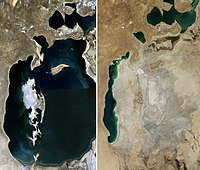
Photo from wikipedia
Inhabited islands in China now face increasing stress from urbanisation and related development policies. Since the National New Area was established in 2011, dramatic land-use changes in the Zhoushan Archipelago… Click to show full abstract
Inhabited islands in China now face increasing stress from urbanisation and related development policies. Since the National New Area was established in 2011, dramatic land-use changes in the Zhoushan Archipelago have affected its ecosystem health and biodiversity. The National New Area policy further promoted Zhoushan’s economic development but exerted more pressure on its ecosystems. To explore sustainable development, this study attempts to determine how ecosystems in the archipelago have been impacted through the variation in ecosystem services value (ESV) by means of the InVEST model. The outcomes indicate that: (i) the total ESV and carbon storage have declined, with a remarkable increase in built-up land and decrease in farmland and wetland; (ii) the encroachment on farmland and wetland by built-up land is identified as the main reason for the impairment of ecosystem services; (iii) the National New Area policy has affected the island ecosystems by transforming the orientation of development to a national strategic position, encouraging specific kinds of spatial planning with different development patterns and focuses, and introducing preferential policies on administration, land use, etc.
Journal Title: Information Systems Journal
Year Published: 2017
Link to full text (if available)
Share on Social Media: Sign Up to like & get
recommendations!